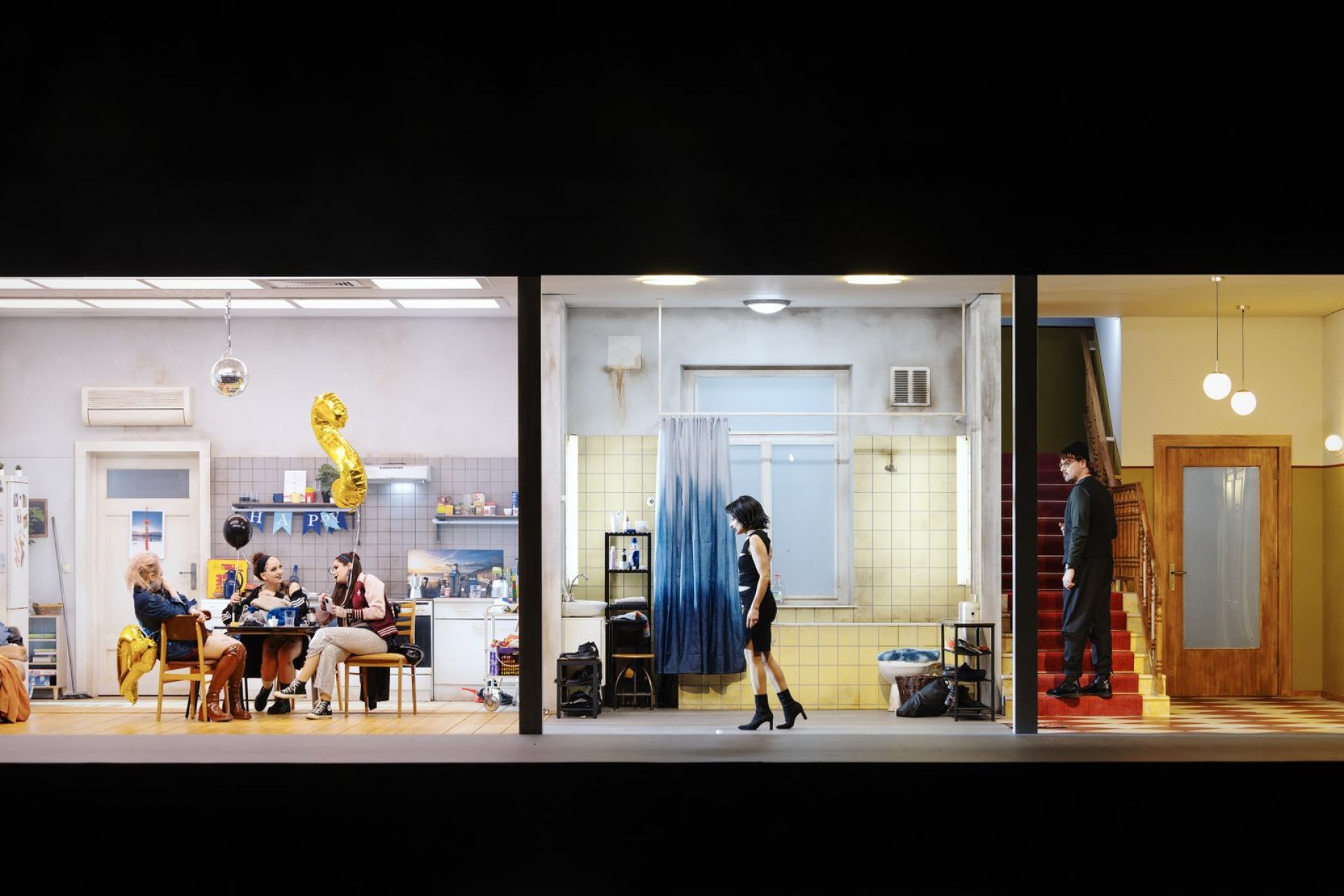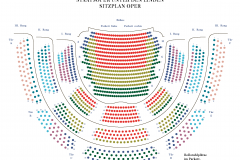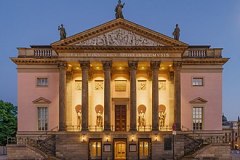Rusalka
February 2025 | ||||||
|---|---|---|---|---|---|---|
Mo | Tu | We | Th | Fr | Sa | Su |
LYRICAL FAIRYTALE IN THREE ACTS (1901)
MUSIC BY Antonín Dvořák
TEXT BY Jaroslav Kvapil
Rusalka, a water creature, has fallen in love with the seemingly unattainable prince. To find a place in his world and be close to him, she even gives up the power to speak and changes her shape. But can Rusalka live contrary to her nature? Can a love for which you have to deny your identity last?
Librettist Jaroslav Kvapil used various fairy tales and myths as a source for his psychological and symbolist text. Antonín Dvořák’s opulent and dazzling score, which turned out to be his first operatic success, is a true feat of composition whose complex subject matter is open to a wide range of interpretations. Kornél Mundruzcó, who recently staged the opera »Sleepless« by Peter Eötvös, which was awarded the Staatsoper »Premiere of the Year«, emphasises the relevance of the material today in his interpretation. The piece is a drama about a woman’s soul as well as a modern fairy tale that raises questions about identity and physicality.
PLOT
None of the characters in Dvořák’s opera has an individual name; they are all identified by their position or profession. In the translation, only Rusalka (Water Nymph) and Ježibaba (Witch) retain their Czech names.
ACT ONE
Rusalka tells the Water Sprite that she has fallen in love with the Prince and admits that she longs to have a human soul. The Water Sprite warns her urgently against entering a relationship, but Rusalka has made up her mind. She summons Ježibaba to transform her.
She informs Rusalka of the consequences of her act: she will have to sacrifice her voice and gain the love of the prince. Otherwise, she will be struck by a curse that brings about the downfall of both her and her beloved. But Rusalka refuses to be dissuaded, and Ježibaba casts her spell. Soon afterward, Rusalka and the Prince meet, and she follows him to his world.
ACT TWO
Preparations for Rusalka’s marriage to the Prince are made.
The Kitchen Boy and the Gamekeeper gossip about the strange bride, who never speaks and whose name nobody knows. The Prince also tries without success to find out Rusalka’s secret.
The Foreign Princess invited to the marriage festivities beguiles the Prince and encourages him to pay more attention to his guests. Rusalka is left behind, alone. The Water Sprite seeks her out and deplores her fate.
In his presence, Rusalka regains her voice. Oblivious to what is going on, the Prince declares his love to the Foreign Princess. The Water Sprite warns that he will not escape Rusalka’s embrace.
ACT THREE
In search of a way out, Rusalka, who through the curse has now become a will o’ the wisp, summons Ježibaba once again. She suggests to Rusalka to kill her beloved; only in that way the curse can be broken.
Rusalka rejects the proposal. Meanwhile, the Gamekeeper and the Kitchen Boy seek out Ježibaba and ask for advice for the confused Prince, in whose chambers strange things are taking place.
The Water Sprite chases them away and swears revenge. The penitent Prince seeks out the rejected Rusalka.
A renewed meeting takes place, where they fall into one another’s arms, before Rusalka gives the Prince a final kiss.
Program and cast
Duration: approx. 3:05 hrs including one interval
Language: In Czech language with German and English surtitles
Recommended age: 12 years and older
Preface 45 minutes before the start of the performance in the Apollosaal
Important note!
Stroboscopic effects are used in this production.
CAST
MUSICAL DIRECTOR: Tomáš Hanus
DIRECTOR: Kornél Mundruczó
SET DESIGN, COSTUMES: Monika Pormale
LIGHT: Felice Ross
VIDEO: Rūdolfs Baltiņš
RUSALKA: Christiane Karg
PRINZ: Brian Jagde
FREMDE FÜRSTIN: Anna Samuil
WASSERMANN: Jongmin Park
JEŽIBABA: Anna Kissjudit
HEGER: Jaka Mihelač
KÜCHENJUNGE: Clara Nadeshdin
ERSTE ELFE: Maria Kokareva
ZWEITE ELFE: Rebecka Wallroth
DRITTE ELFE: Sandra Laagus
JÄGER: Taehan Kim
STAATSOPERNCHOR
STAATSKAPELLE BERLIN
State Opera Unter den Linden
Staatsoper Unter den Linden is one of Berlin's most prestigious opera houses, with a rich history and significant cultural impact.
History:
The Staatsoper Unter den Linden was originally built between 1741 and 1743, under the direction of architect Georg Wenzeslaus von Knobelsdorff. It was commissioned by Frederick II of Prussia and was initially named the Königliche Oper (Royal Opera). The opera house has undergone several renovations and reconstructions, notably after World War II damage. It reopened in 1984, following a major renovation.
Construction:
The original design was characterized by its Baroque style, featuring an elegant façade and a grand entrance. The building was reconstructed in the 1950s and 1980s, maintaining its classical exterior while modernizing the interior. The façade features a classic portico with six Corinthian columns and a prominent central pediment.
Interior:
The interior is known for its opulent and classical design. The auditorium is renowned for its acoustics and grandeur, with luxurious velvet seats and elaborate decorations. The stage and seating areas have been updated to meet modern performance standards while preserving historical aesthetics.
Concerts and Performances:
The Staatsoper Unter den Linden hosts a variety of performances, including operas, orchestral concerts, and ballet. It is home to the Staatskapelle Berlin, one of Germany's leading orchestras. The opera house is celebrated for its high-quality productions and its role in Berlin’s vibrant cultural scene.
JOURNEY
The Staatsoper Unter den Linden has completely barrier-free access due to its excellent public transport connections.
ADDRESS: Unter den Linden 7; 10117 Berlin
SUBURBAN RAILWAY
S+U Friedrichstraße (S1, S2, S5, S7, S25, S75)
SUBWAY
Hausvogteiplatz (U2)
Museumsinsel (U5)
Stadtmitte (U2, U6)
Unter den Linden (U5, U6)
BUS
Staatsoper (100, 245, 300)
Unter den Linden/Friedrichstraße (100, 147, 245, 300, N6)
PARKING
Q-PARK parking garage Unter den Linden/Staatsoper
Bebelplatz, 10117 Berlin
There are five electric charging stations in the parking garage. Further information can be found here.
The underground car park on Bebelplatz offers disabled parking spaces and direct access to the opera house. On entering the car park between 5.30pm and 11.30pm, the maximum parking fee is €7. To use this tariff, enter your parking ticket in one of the pay machines and the message »Theatertarif« will appear on the display. Please note that it is not possible to use the tariff if you enter the car park before 5.30pm. so it will not be shown on the display. TIP: If you pay the theatre tariff at the pay machine before the event, you can avoid unnecessary waiting after the show.

 EN
EN DE
DE IT
IT FR
FR ES
ES RU
RU JP
JP RO
RO
 Seating plan
Seating plan 

